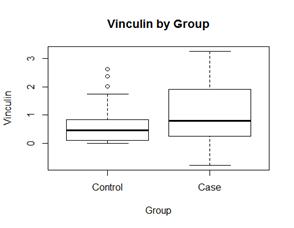Session Information
Session Type: ACR Poster Session C
Session Time: 9:00AM-11:00AM
Background/Purpose: Vascular involvement has a major impact on the pathogenesis of Systemic sclerosis (SSc) and there is evidence that microvascular damage with endothelial cell activation may direct the phenotypic presentation of the disease. Endothelial Vinculin has a crucial regulatory role during angiogenesis(1). Villano et al., showed that expression of vinculin was significantly higher in endothelial cells challenged with the sera of SSc pts than endothelial cells treated with sera from healthy controls(2). Hence, the dysregulated vinculin expression may add to defective angiogenic processes already present in SSc. We hypothesize that over- expression of Vinculin in SSc may trigger anti-vinculin antibodies (abs) which may contribute to vasculopathic features in SSc. Objective: To measure the levels of anti-Vinculin antibodies in serum of scleroderma patients, in comparison to Healthy controls and to correlate their levels with SSc related outcome measures. Methods: Serum samples from 72 SSc patients meeting the ACR/EULAR 2013 SSc criteria and 50 healthy controls were recruited. Serum levels of anti-vinculin antibodies were determined by ELISA. Clinical data were obtained from charts for statistical correlations.
Results: The 72 SSc pts’ characteristics: 32(48.4%) diffuse SSc , mean age: 56.4(SD ± 18); active skin ulcers 17(25.7%), mean GIT 2.0 was 0.373; interstitial lung disease (ILD) 40 (55%)pts; Pulmonary artery hypertension (PAH) 23(31%)pts. Mean anti-Vinculin levels were significantly higher in SSc pts (1 ug/ml SD ±1 ) than in healthy controls (0.6 ug/ml SD ± 0.6) p < 0.01. Figure 1. In the linear regression models, BMI was a significant predictor of higher anti-vinculin (p<0.005). PAH trended to predict higher anti-vinculin (p=0.052). The lack of usual statistical significance may be due to low statistical power of (post-hoc power=0.44) and might be detectable in a larger sample. Neither Skin ulcer (p=0.752) nor Raynaud’s severity by visual analogue scale (p= 0.591) predicted higher anti-vinculin antibodies.
Conclusion: We report for the first time, higher levels of anti-vinculin antibodies( a potential marker of vascular involvement) in SSc patients than controls and a trend to correlation with PAH. Further research is warranted on more SSc patients to evaluate the role of anti-vinculin antibodies as markers of vascular involvement(i.e., PAH) and to identify their role in the pathogenesis of SSc /SSc-PAH.
References (1)Deroanne CF, Colige AC, Nusgens BV, Lapiere CM: Modulation of expression and assembly of vinculin during in vitro fibrillar collagen induced angiogenesis and its reversal. Exp Cell Res 1996, 224:215-223. (2)Villano et al. Systemic sclerosis sera affect fibrillin-1 deposition by dermal blood microvascular endothelial cells: therapeutic implications of cyclophosphamideArthritis Research & Therapy 2013, 15:R90
Figure 1: showing the Levels of antivinculin antibodies in SSc and healthy controls.
To cite this abstract in AMA style:
Suliman YA, Kafaja S, Alemam M, Valera I, Morales W, Pimentel M, Furst DE. Anti-Vinculin Antibodies: A Novel Biomarker in Systemic Sclerosis, and Its Association with Vascular Involvement [abstract]. Arthritis Rheumatol. 2016; 68 (suppl 10). https://acrabstracts.org/abstract/anti-vinculin-antibodies-a-novel-biomarker-in-systemic-sclerosis-and-its-association-with-vascular-involvement/. Accessed .« Back to 2016 ACR/ARHP Annual Meeting
ACR Meeting Abstracts - https://acrabstracts.org/abstract/anti-vinculin-antibodies-a-novel-biomarker-in-systemic-sclerosis-and-its-association-with-vascular-involvement/

